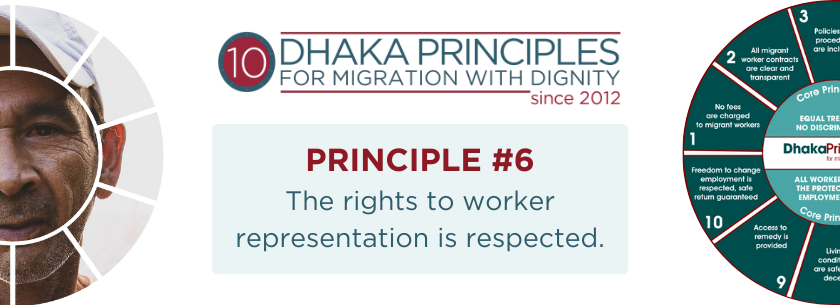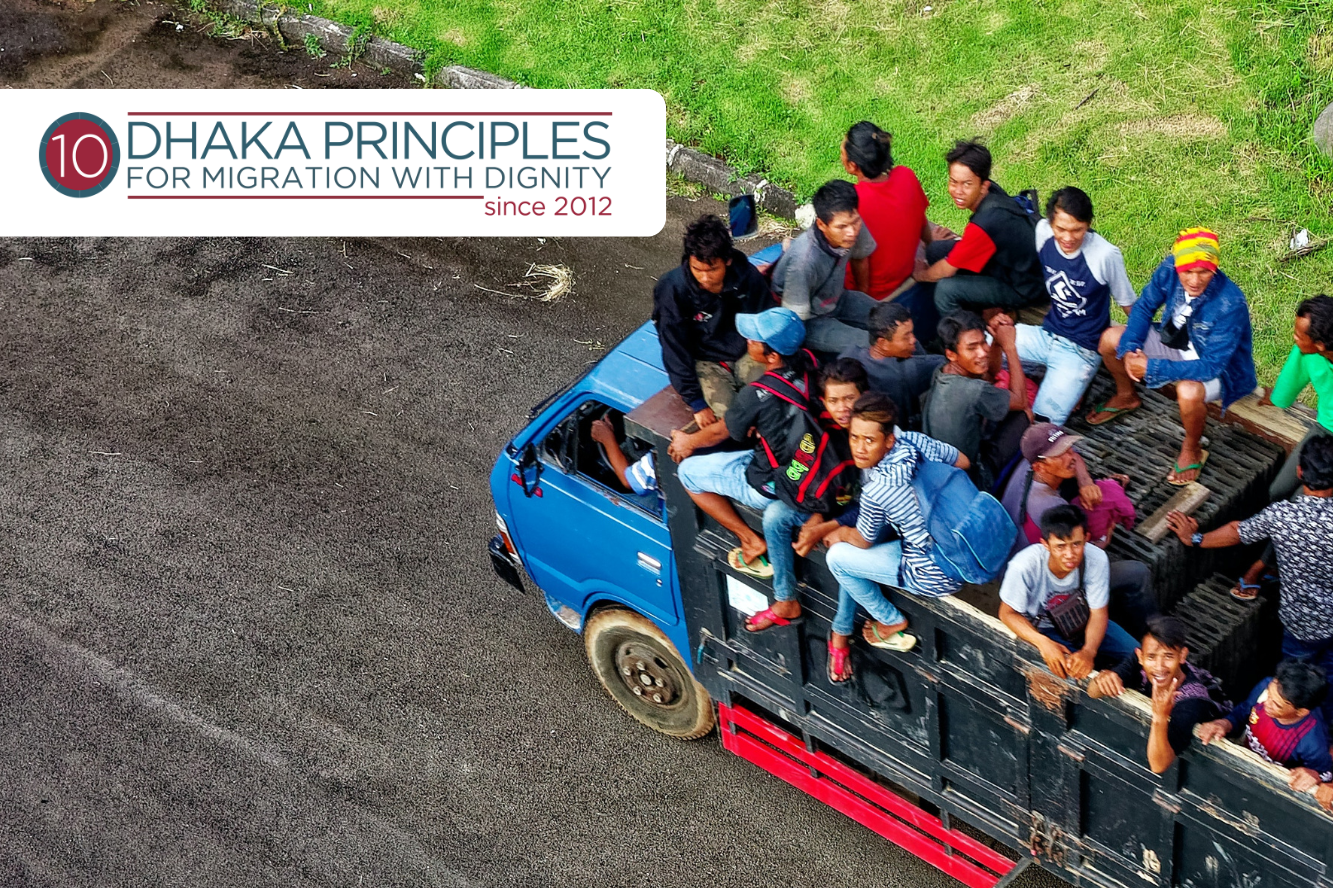Throughout 2022, IHRB is marking ten years of the Dhaka Principles for Migration with Dignity with guest commentaries from representatives of business, trade unions, civil society organisations, and the UN system that reflect on the continuing importance of each of the twelve individual Principles. These experts are exploring challenges relating to each Principle in turn and discussing how faster progress can be made.
Principle 6 - The right to worker representation is respected
Migrant workers should have the same rights to join and form trade unions and to bargain collectively as other workers.
Trade unions play a vital role in promoting occupational health and safety standards, addressing grievances, and lobbying for improved working conditions. Unions give voice to workers, providing a critical communication channel between worker representatives, employers and government. National trade unions represent the interests of a wide range of members, from drivers and cleaners to teachers and lawyers. At the global level, the international trade union movement leads on campaigning and advocacy, representing workers at international fora such as the International Labour Organization (ILO) and the OECD, as well as promoting labour rights in countries where unions are banned or restricted.
For migrant workers, trade unions can play a critical role in promoting a rights-based approach to migration. In countries like Lao PDR, Cambodia and Malaysia, unions provide direct assistance to migrants and prospective migrants, providing information, training and legal support services, and contributing to the development of legislation to better protect their rights. In countries with shrinking civil society space, trade unions support migrant workers through international affiliations and connections with a large network of partners globally. In Thailand, despite recent legislative proposals seeking to restrict civil society activities, the government announced plans to establish a labour union for migrant workers as part of its efforts to prevent human trafficking and improve standards in workplaces.
Workers’ rights to organise and bargain collectively are fundamental rights, as defined by ILO Conventions 87 and 98, and enshrined in the Universal Declaration of Human Rights. Under ILO standards, all workers, including migrant workers, should enjoy freedom of association without distinction or discrimination of any kind. Yet in far too many countries, migrant workers are unable to access or benefit from protections a trade union may offer, increasing their vulnerability to substandard working and living conditions and, ultimately, exploitation.
Enshrined in the Universal Declaration of Human Rights …[and] under ILO standards, all workers, including migrant workers, should enjoy freedom of association without distinction or discrimination of any kind.
In other cases, even if allowed to join unions, migrant workers may not be prioritised as a traditional trade union constituency. Organising and recruiting migrant members may require unions to overcome language and cultural barriers, to access hard-to-reach worksites and sectors such as agriculture and domestic work, and to tailor approaches to migrants’ specific needs and concerns. Migrant workers are also over-represented in the informal economy and in complex labour supply chains, where temporary work arrangements, often through agencies, can make organising more difficult.
Companies that do not respect the right to worker representation are not meeting their responsibility to respect human rights consistent with international standards. Unionised workplaces tend to be safer, have better wages and clear support systems, and grievance mechanisms should problems arise. Better, safer worksites are more productive, with increased levels of worker satisfaction and less downtime due to industrial disputes.

Where trade unions are barred from operating, employers should facilitate representation and participation of migrant workers in freely elected worker committees or other industrial relations platforms. In 2019, Qatar introduced Joint Committees to promote employee participation and voice at the enterprise level. The revised Labour Law allows companies with more than 30 workers to set up Joint Committees that bring together an equal number of management and elected worker representatives to discuss work-related issues and address workplace conflicts. Such arrangements, however, are compromises and should not be considered as formal trade union representation.
Also in Qatar, global union Building and Wood Workers’ International (BWI) signed an agreement with French construction company VINCI and its Qatari shareholding company QDVC in 2017 to improve working and living conditions of migrant workers in all QDVC operations in the country. The agreement - which is worth noting took place in a context of increased international pressure on Qatar and a broad Labour reform process - represented a significant business commitment in a country that does not fully recognise the right to organise.
Securing the rights of all workers, including migrant workers, and ensuring a Just Transition to new economic and environmental models, will require the support of forward thinking and effective trade unions.
These issues highlight the importance of Dhaka Principle 6. Respect for the right of all workers, including migrant workers, to form or join a trade union – or other forms of worker representation where unions are banned or restricted - and to bargain collectively, should be a public commitment of all business enterprises. Employers should not take any measures that would have the effect of preventing workers, including migrant workers, from enjoying this right, whether at the recruitment, employment or termination stage. In addition, recruitment/placement agreements and employment contracts should not contain provisions that would prohibit or have the effect of discouraging workers from exercising their right to freedom of association and collective bargaining.
Lastly, while voluntary initiatives on corporate responsibility, such as codes of conduct, social auditing and certification schemes may be helpful in identifying risks and gross violations of workers’ rights, they cannot effectively promote and improve labour standards without real engagement and dialogue with worker representatives. This will become ever more important with increased numbers of workers on the move due to the environmental and economic impacts of the climate crisis. Securing the rights of all workers, including migrant workers, and ensuring a Just Transition to new economic and environmental models, will require the support of forward thinking and effective trade unions. Worker representation is essential to protecting migrant workers and supporting better business practices. Any initiative that does not respect the freedom of workers to organise and bargain collectively fails to meet that test.

This month’s expert is Julia Batho, IHRB's Deputy Chief Executive.
Julia is a human rights expert with over 15 years’ experience in policy research and advocacy, stakeholder engagement, and project and team management in the areas of international labour standards and labour migration. Julia manages IHRB’s strategic planning and implementation, and has oversight of the monitoring and evaluation of programmes. Julia collaborates closely with the CEO and COO in the day-to-day management of the organisation and in the strategic development of its subsidiaries and associated entities.





























The perception of ‘value’ needs to change if the World Bank’s mission is to succeed
Last week we attended the Spring Meetings of the World Bank and International Monetary Fund (IMF) in Washington, D.C. The annual IMF-World Bank meetings bring together finance ministers and central bankers from all regions as a platform for official...
26 April 2024 | Commentary
Commentary by Vasuki Shastry, Author, ESG/Strategic Communications Expert; International Advisory Council, IHRB Haley St. Dennis, Head of Just Transitions, IHRB